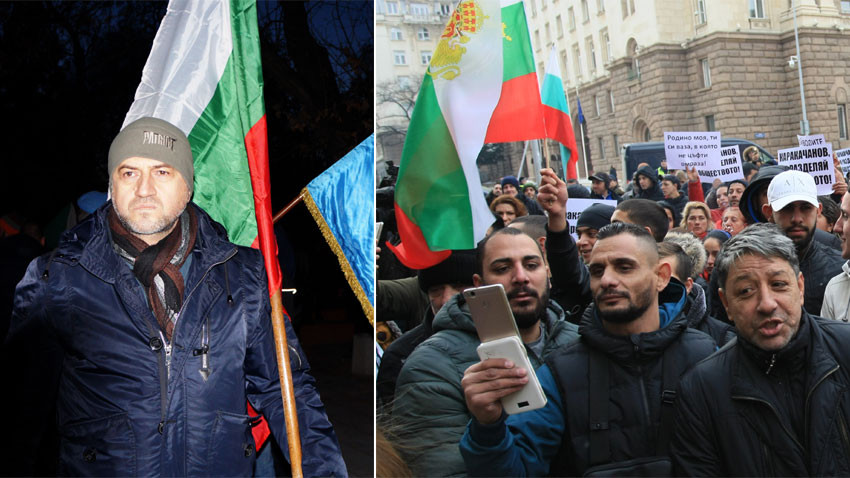
Over the past few days public attention has been focused on the bickering over road construction, the acquisition of new fighter aircraft for the Bulgarian air forces and a string of other issues, yet, another controversy has loomed large, connected with the Roma. And once again it comes at a time of fast approaching elections, as if specifically to corroborate the presumption that the Roma problem is an instrument political forces wield for their own political ends.
After decades of efforts to resolve it, the problem obviously remains unsolved. And that is a dangerous thing, judging by the speed with which an isolated occurrence in a small village far from Sofia grew into a dispute of national proportions, was politicized and escalated into a demonstration in front of the Council of Ministers building with demands for the resignation of Deputy-Prime Minister and Minister of Defence Krasimir Karakachanov.
The indignation of the Roma was caused by Minister Karakachanov’s caustic words, as he commented the assault on an army man by two young men of Roma origin from Voivodinovo village. He said “Gypsies in Bulgaria have grown exceedingly insolent and the tolerance of Bulgarian society has worn thin,” and after this statement, the village mayor gave instructions for the demolition of the illegally-built Roma houses in the village. There followed protests, typical in cases such as this – by the Roma, and counter-protests as a show of solidarity with the defence minister. These were followed by comments and analyses by observers, political analysts and social anthropologists, an indication that it is a problem society is highly sensitive to.
But, as has happened before, the outburst of indignation has, once again, been contained. The protests in Voivodinovo stopped in anticipation of the expiration of the deadline for contestation of the demolition of the houses. The two young men of Roma origin arrested for assault on the soldier will probably also contest the charges, the soldier is making a successful recovery. One more Roma-connected conflict has been quelled, but the causes that led up to it remain.
One of them is that the ethnic group continues to be unintegrated into society. Efforts to integrate them have gone on for decades, including under the “National action plan – decade of Roma inclusion 2005-2015”, part of an international initiative aimed at Roma integration. The various councils, centres, committees, interdepartmental groups set up under this initiative have evidently been inefficient. Now Minister Karakachanov, who is a member of the cabinet as a representative of the junior coalition partner United Patriots, is advocating a comprehensive programme to solve the Roma problem. His personal opinion is that the only way to integrate the Roma efficiently is to include them in the processes of education and labour, an opinion many support. A Barometer Bulgaria survey conducted a few days ago shows that Karakachanov’s views are approved by 73 percent of the respondents, far more than the electorate of the United Patriots. No more than 12.1 percent uphold the opposite view.
A solution to the problem will not be found by going to extremes, it will take patience and will mean avoiding the temptation of politicization. Whether the political forces in the country agree with the latter is something we shall see on the election trail, with elections for European Parliament and local elections coming up this year.
Edited and translated by: Milena Daynova
Over 3.5 million Ukrainians have arrived in or passed through Bulgaria since the beginning of the war. Nearly 200,000 people have found temporary shelter in the country, announced Anna Tertychna from the Ukrainian Embassy in Bulgaria. She..
At the Bulgarian Embassy in London, Prof. Bettany Hughes presented excerpts from the new BBC series - Wonders of Bulgaria. Prof. Bettany Hughes is the author of two episodes of the documentary. Hughes is a historian, writer, author of..
According to the Annual Report on the Health Status of Bulgarian Citizens for 2023, t he main cause of death in Bulgaria is diseases of the cardiovascular system (61.1%), followed by oncological diseases (16.5%) and diseases of the respiratory system..
An innovation for the treatment of diabetic foot ulcer using the patient's own tissue and artificial intelligence has been implemented at the University..
Over 3.5 million Ukrainians have arrived in or passed through Bulgaria since the beginning of the war. Nearly 200,000 people have found temporary..
At the Bulgarian Embassy in London, Prof. Bettany Hughes presented excerpts from the new BBC series - Wonders of Bulgaria. Prof. Bettany..

+359 2 9336 661
